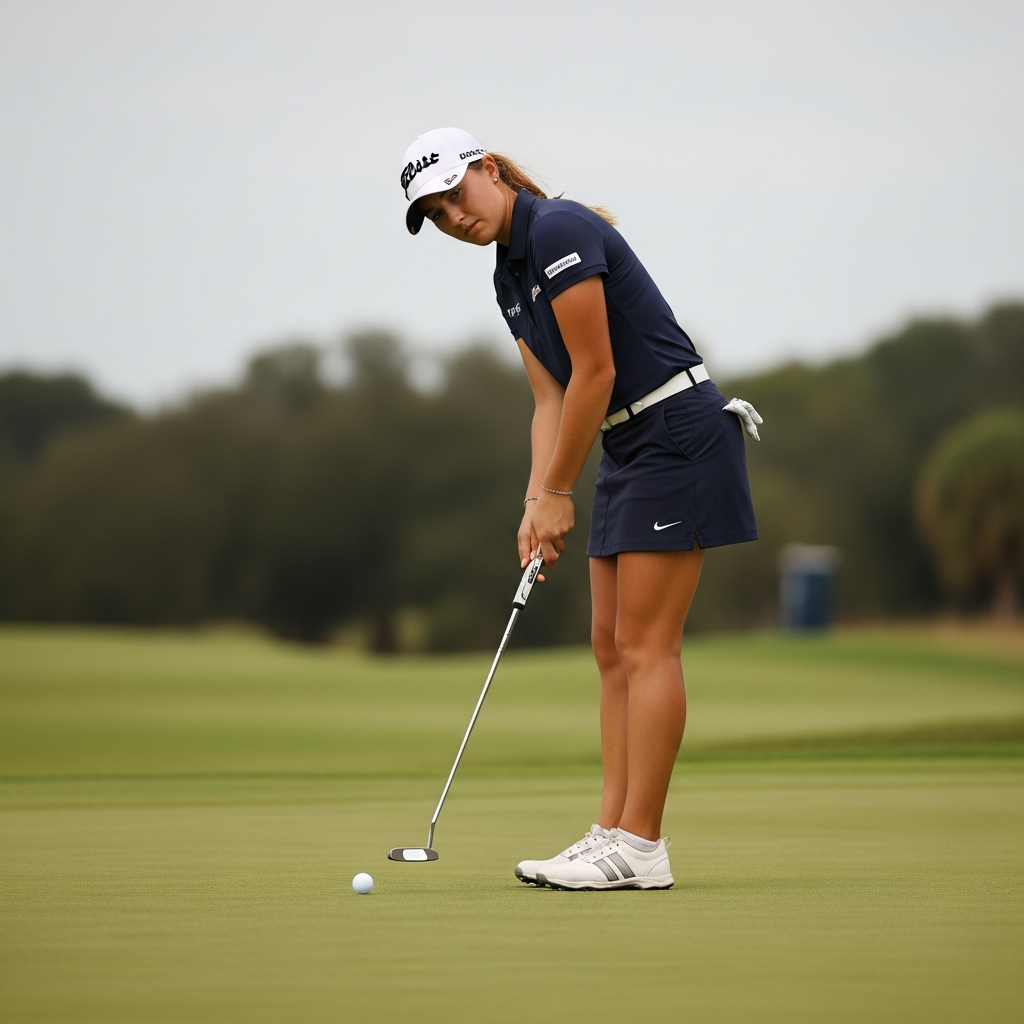The world of professional golf recently turned its eyes to an intriguing debut at the Annika tournament in Florida: Kai Trump’s LPGA debut. The 18-year-old amateur, granddaughter of former U.S. President Donald Trump, stepped onto the demanding Pelican Golf Club course as a sponsor exemption, facing immense pressure and scrutiny. While she ultimately missed the cut, finishing 18-over par and last in the 108-player field, her performance was a compelling narrative of resilience, dramatic improvement, and the invaluable lessons gleaned from competing at golf’s elite level.
A High-Stakes Introduction: Nerves and Unprecedented Scrutiny
Stepping onto an LPGA stage is daunting for any amateur, but for Kai Trump, the spotlight was unusually intense. Competing as a sponsor exemption, her participation sparked considerable debate. Tournament organizers, including Pelican Golf Club owner Don Doyle Jr., openly stated the exemption was aimed at generating “notoriety” and “attention” for the event. This strategy undeniably created a “buzz,” attracting new viewers, particularly younger audiences from platforms like Instagram, who might not typically follow women’s golf.
Her initial round on Thursday reflected the immense pressure. Trump, still a high school senior, posted a challenging 83. She later confessed, “For the first day I was definitely really nervous. I think the nerves just got to me.” This raw admission highlights the mental hurdle faced by even seasoned professionals, let alone an amateur making her professional debut under such a public gaze. Spectators and Secret Service presence added to the unique atmosphere surrounding her play.
A Tale of Two Rounds: Dramatic Improvement and Composure
The narrative shifted dramatically in Kai Trump’s second round. Demonstrating remarkable composure and mental fortitude, she shaved eight strokes off her opening score, carding a respectable five-over 75. This significant improvement was not just a statistical win; it was a testament to her ability to adapt and learn under pressure. Trump attributed her turnaround to a change in mindset: “When I went out there today I felt very calm and peaceful to be honest with you. That’s why I played better.”
Her second-round scorecard featured impressive moments, including four birdies on the third, seventh, 11th, and 12th holes. She even came agonizingly close to her maiden hole-in-one on the 12th, nearly sinking an eight iron from 140 yards. Despite a challenging triple-bogey seven on the par-four fifth, she maintained a philosophical approach, influenced by advice from golf legend Tiger Woods, who suggested she “go out there and have fun and just go with the flow.” Trump’s ability to “laugh off” mistakes and “move on” after a tough shot underscored her resilient attitude. She even managed to par the notoriously challenging 18th hole on both days, a noteworthy achievement for any player.
Beyond the Scorecard: Resilience and Learning on a Tough Course
While the final leaderboard position doesn’t reflect a competitive victory, the qualitative aspects of Kai Trump’s LPGA debut tell a more profound story. Her coach at the University of Miami, Jim Garren, emphasized the unprecedented pressure she faced, predicting she would “never play a more pressure-filled round in her career.” He noted the immense challenge of transitioning directly from junior golf to a “big-time event” before even collegiate play.
England’s Charley Hull, a seasoned professional who played ahead of Trump, provided valuable context. Hull praised Trump’s driving statistics, noting her average of 241 yards off the tee and finding 11 of 14 fairways. Hull commented, “That’s really good, considering this is not just an easy LPGA event, this is probably one of the harder courses that we play on.” This expert endorsement highlights Trump’s fundamental golf skills, which shone through despite the nerves and score. Tournament host and Hall of Famer Annika Sorenstam, herself a recipient of a controversial PGA Tour exemption in 2003, empathized with Trump. Sorenstam lauded Kai’s toughness and emphasized that such opportunities, while controversial, ultimately “bring attention to the tournament, to the sport and to women’s sports.”
The Sponsor Exemption Debate: Publicity vs. Genuine Opportunity
The discussion surrounding Kai Trump’s participation heavily revolved around her sponsor exemption. Critics questioned the legitimacy of the invitation, given her relatively low ranking (461st in the American Junior Golf Association) and limited competitive experience, having played only three events this season. However, proponents argue that such exemptions, even when not based purely on merit, serve a vital role in broadening the appeal and viewership of golf, particularly women’s golf.
Don Doyle Jr.’s candid explanation that Trump’s “millions of social media followers and famous last name” were key factors underscores the evolving landscape of sports marketing. While not a direct parallel to Sorenstam’s exemption (who was world No. 1 when she played a PGA Tour event), both instances leveraged high-profile personalities to generate interest. For the LPGA, the hope is that this heightened viewership will translate into sustained engagement, attracting new fans to future events and supporting the growth of the sport.
Looking Ahead: University of Miami and Beyond
Kai Trump’s LPGA debut, while ending with a missed cut, offers a strong foundation for her future. She has committed to play collegiate golf for the University of Miami next year, and this professional experience will undoubtedly be a crucial stepping stone. The lessons learned about managing nerves, bouncing back from challenging holes, and competing against top-tier talent are invaluable for her development.
Her positive attitude, exemplified by her response when asked what she would report back to her grandfather – “That I hit a great shot on 18 two days in a row” – speaks volumes about her focus on progress and enjoyment. This unique opportunity has not only provided a glimpse into her potential but has also served as an early, rigorous test of her mental game and competitive spirit. As she transitions to collegiate play, Kai Trump will undoubtedly draw upon this memorable professional debut to refine her skills and continue her journey in competitive golf.
Frequently Asked Questions
What was the outcome of Kai Trump’s LPGA debut at the Annika tournament?
Kai Trump, an 18-year-old amateur and granddaughter of Donald Trump, made her LPGA debut at the Annika tournament in Florida. She ultimately missed the cut, finishing last among 108 players with an overall score of 18-over par. Despite missing the cut, she showed significant improvement, reducing her score by eight strokes from her first round (83) to her second round (75), which included four birdies.
Why was Kai Trump’s participation in the Annika tournament controversial?
Kai Trump participated via a sponsor exemption, which drew criticism because it was not primarily based on her junior golf ranking (461st in the AJGA) or extensive competitive record. Tournament organizers openly stated the exemption’s purpose was to generate “notoriety” and “attention” for the event, leveraging her famous last name and social media following to attract new viewers, particularly to women’s golf.
What does Kai Trump’s LPGA experience mean for her future in golf?
Despite missing the cut, her LPGA debut provided invaluable experience. It offered a high-pressure learning environment, helping her manage nerves and demonstrate resilience, as evidenced by her significant improvement. This experience is expected to be highly beneficial as she prepares to play collegiate golf for the University of Miami next year, providing a strong foundation for her continued development in competitive golf.



